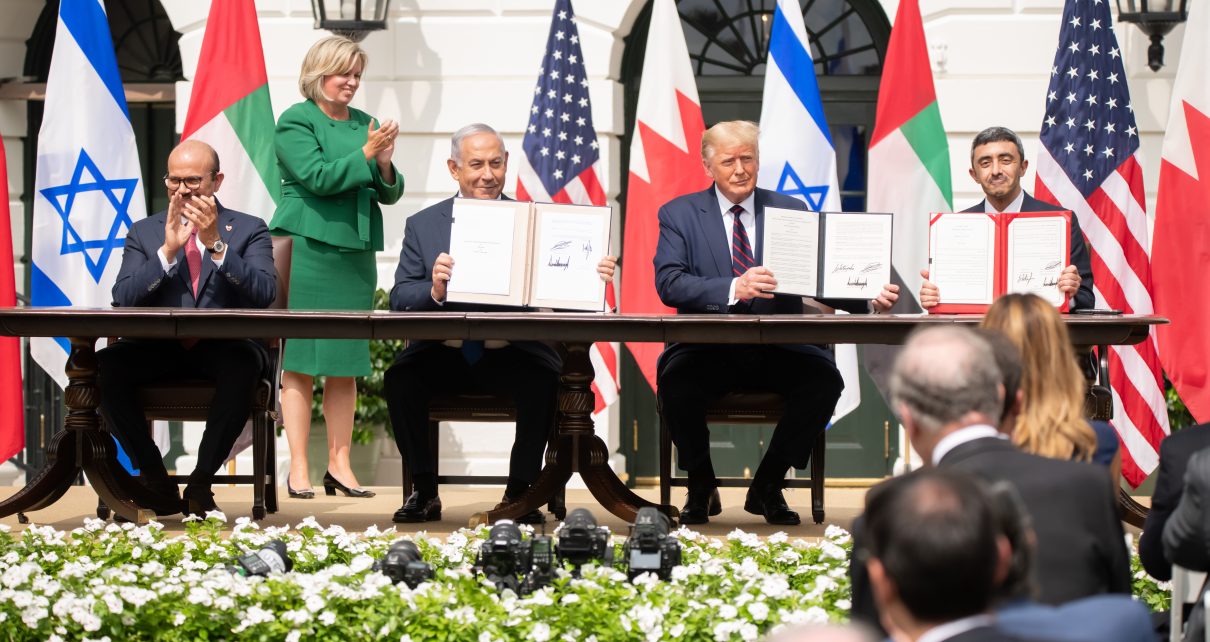
Benjamin Netanyahu, Donald Trump, Abdullatif bin Rashid Al Zayani, and Abdullah bin Zayed Al Nahyan attend the Abraham Accords ceremony in The White House, Sept. 2020. (Photo: Shutterstock)
OPINION: Like It or Not, The Next President Must Be a ‘War Time’ President
Unlike the year 2000, we should have a clear view in 2024 of what challenges lie ahead
By Brett Sutton, October 31, 2024 11:11 am
The most important challenge for the next President of the United States likely will be leading the country in war — and almost no one is talking about it.
Given the long list of domestic issues, it’s easy to see how the focus of the average voter might be more heavily trained on things like grocery prices, open borders or housing costs. However, given the violent state of the world right now and shifting geopolitical tensions, ignoring foreign affairs is a luxury we won’t soon be able to enjoy.
Indeed, war clouds are gathering and there are no indications America is going to be capable of avoiding direct or indirect involvement on a number of fronts. The fact that such a possibility has garnered relatively little attention among the political news media during most of the presidential campaign is a disservice to voters.
To be sure, this isn’t the first time world events will force a president to focus on grave national security concerns that went largely undiscussed during the general election. During the 2000 race between George W. Bush and Al Gore, for example, virtually no one was focused on the threat of Islamic terrorism. The big issues of the campaign season were largely domestic budgetary matters — such as the nation’s supposed “budget surplus” from the 90s and Al Gore’s repeated reference to a “Lock Box” for entitlement programs.
On September 11, 2001, everything changed.
America wasn’t completely unfamiliar with the risk of radical Islamic terrorism as President Bush took office. The years prior saw a handful of escalating attacks such as the attack on the U.S.S. Cole and the bombing at the World Trade Center. However, when the Twin Towers collapsed and thousands of Americans lost their lives on 9/11, the nation was suddenly thrust into a far more dangerous and volatile world — a world that no voter would have thought possible just 10 months earlier when we had cast our ballots.
Unlike the year 2000, we should have a clear view in 2024 of what challenges lie ahead.
As we see how quickly relations have deteriorated in the Middle East — having been only a year since Hamas terrorists first thrust Israel into conflict — international tensions can rapidly spiral out of control. The Middle East is now closer to all-out war than any time since American Troops first touched the ground as part of the Global War on Terror in late 2001.
Israel is under attack on multiple fronts and regional alliances are degrading rapidly. Turkish President Tayyip Erdogan, a supposed NATO ally, has even called upon the United Nations to use force against Israel if it continues its counter offensive against terrorist factions in Lebanon and elsewhere — demonstrating that Hamas, Hezbollah and other Iranian proxies aren’t the only ones willing to go to war with Israel.

Elsewhere in the world, the situation isn’t much better.
In recent weeks, the U.S. Navy’s Chief of Naval Operations Adm. Lisa Franchetti announced a series of measures to prepare for war with China by 2027 — the same year China’s President Xi told his forces to be ready to invade Taiwan. In September of this year, the latest bipartisan Commission on the National Defense Strategy report warned that the US must increase defense spending to Cold War levels to deal with the growing threat of China, Iran, Russia and North Korea.
And that’s to say nothing of the ongoing conflict in Ukraine — a conflict that has not only jeopardized the prospect of peace in Eastern Europe, but also emboldened Russia to strengthen its ties with other anti-American antagonists, primarily China.
As we near the end of the Biden-Harris administration’s tenure, the world looks drastically more imperiled than it did just four short years ago. Contrary to what many had predicted, President Trump didn’t lead us into a third world war. Instead, he presided over a remarkably peaceful term — even producing a historic peace accord in the Middle East. It wasn’t until Biden-Harris took residency in the White House that Putin invaded Ukraine, Hamas terrorists declared war on Israel, China ramped up its military ambitions and allies such as Saudi Arabia moved away from their historically close relationship with the US and toward China.
Simply put, the world is closer to devolving into all-out war today than any time in recent memory, and yet, discussions about which candidate will best handle such likely worldwide conflict isn’t even an afterthought in most news cycles.
In what was the only presidential debate between Trump and Harris, there was no substantive focus on China’s historic buildup of its military or it’s deepening alliance with rogue nations that have long been at odds with America’s national interests such as Russia, Iran and North Korea. And until recent attacks in the Middle East pushed Israel’s ongoing conflict onto the front-page, little attention was given by political news coverage to the region’s relentless slide back into disarray and conflict over the last few years.
These major military threats aren’t abstract political quandaries. Instead, they are a warning that the next President of the United States is likely to engage the American military in direct confrontation as our commander in chief — perhaps in more than one theater simultaneously.
Whether we like it or not, who we elect in November must be prepared to serve as a “war time” president.
- OPINION: The First Amendment is the Biggest Story of the 2024 Presidential Election - December 14, 2024
- OPINION: Like It or Not, The Next President Must Be a ‘War Time’ President - October 31, 2024




